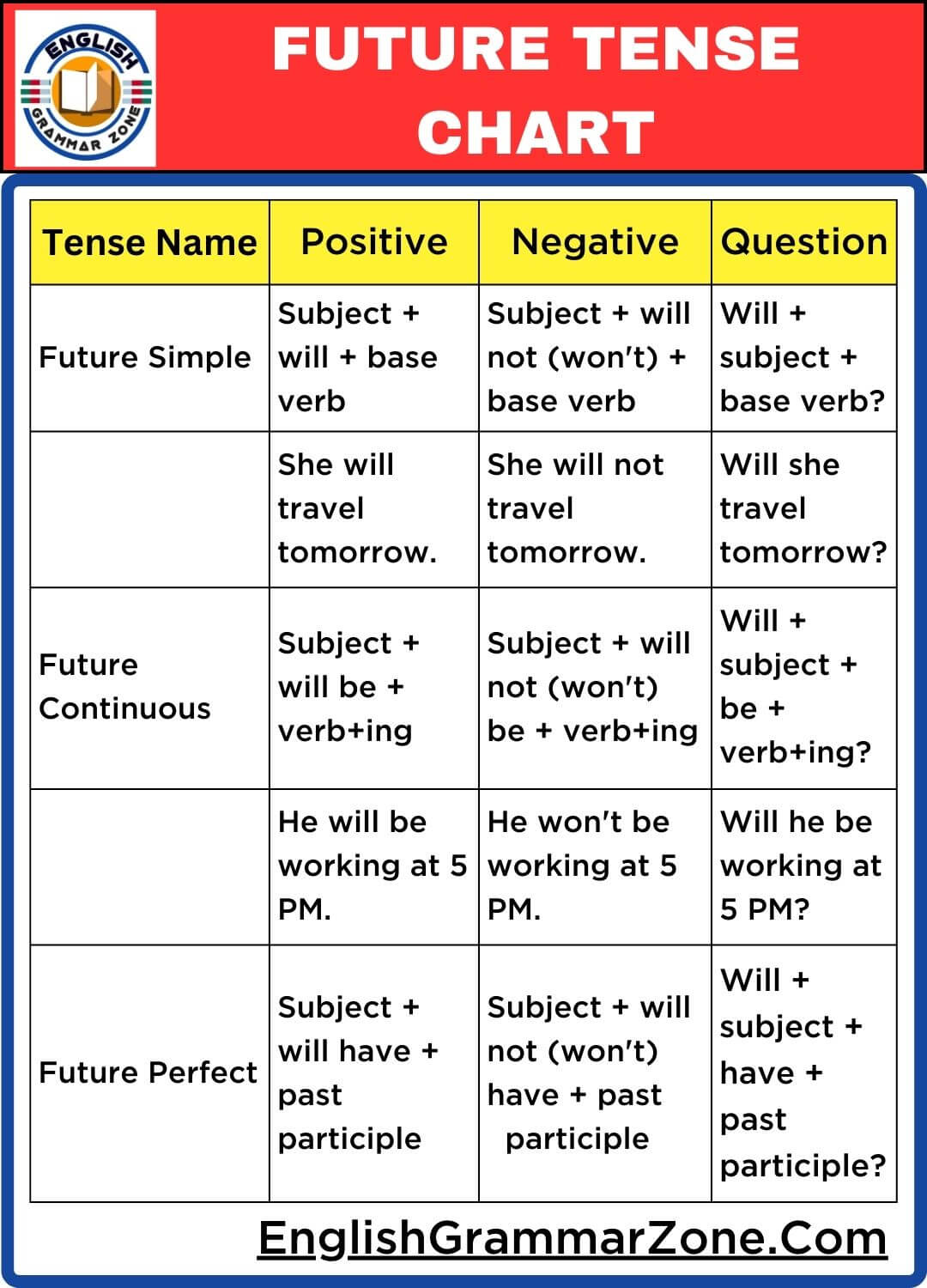Future tenses are essential in the English language as they allow us to express plans, predictions, promises, and possibilities that are yet to happen. Whether you’re a student learning English or someone polishing their grammar, understanding future tenses is a critical step toward mastering the language. This guide will walk you through the key aspects of future tenses, their forms, and when to use them effectively. By the end of this article, you’ll feel confident about using future tenses in everyday conversations and writing.
Let’s explore how future tenses work, along with answers to some of the most common questions learners ask.
Future Tense chart
| Tense Name | Positive | Negative | Question |
| Future Simple | Subject + will + base verb | Subject + will not (won’t) + base verb | Will + subject + base verb? |
| She will travel tomorrow. | She will not travel tomorrow. | Will she travel tomorrow? | |
| Future Continuous | Subject + will be + verb+ing | Subject + will not (won’t) be + verb+ing | Will + subject + be + verb+ing? |
| He will be working at 5 PM. | He won’t be working at 5 PM. | Will he be working at 5 PM? | |
| Future Perfect | Subject + will have + past participle | Subject + will not (won’t) have + past participle | Will + subject + have + past participle? |
| They will have finished by noon. | They won’t have finished by noon. | Will they have finished by noon? | |
| Future Perfect Continuous | Subject + will have been + verb+ing | Subject + will not (won’t) have been + verb+ing | Will + subject + have been + verb+ing? |
| She will have been teaching for five years. | She won’t have been teaching for five years. | Will she have been teaching for five years? |
Picture: 1

Picture: 2

FAQs About Understanding Future Tenses
What is the most common way to express future actions?
The most common way to express future actions is by using the simple future tense with “will” or “shall.” For example:
- I will call you later.
Alternatively, “going to” can also indicate planned actions or predictions based on evidence. - It is going to rain soon.
How is the future continuous tense different from the simple future tense?
The future continuous tense focuses on actions that will be in progress at a specific time in the future. In contrast, the simple future tense highlights actions that will happen at any point in the future.
- Future Continuous: I will be eating dinner at 7 PM.
- Simple Future: I will eat dinner later.
When do we use the future perfect tense?
The future perfect tense is used to describe actions that will have been completed by a specific future time. It often pairs with time markers like by or before.
- Example: She will have submitted the report by 5 PM.
Is ‘going to’ the same as using ‘will’?
Not exactly. While both “going to” and “will” talk about future events, they have subtle differences:
- Use “will” for spontaneous decisions or promises.
- Example: I will help you with that.
- Use “going to” for planned actions or predictions based on evidence.
- Example: I am going to visit my grandparents this weekend.
What Are the Different Types of Future Tenses?
English includes four main types of future tenses:
- Simple Future Tense: Describes actions that will happen in the future.
- Example: I will go to the market tomorrow.
- Future Continuous Tense: Refers to actions that will be ongoing at a specific time in the future.
- Example: She will be studying at 8 PM tonight.
- Future Perfect Tense: Indicates that an action will be completed before a certain future time.
- Example: He will have finished the project by next week.
- Future Perfect Continuous Tense: Highlights actions that will have been happening for a certain duration by a specific time in the future.
- Example: By 2025, they will have been working here for 10 years.
How can I practice future tenses effectively
To practice, try these simple techniques:
- Write sentences or short paragraphs using different future tenses.
- Listen to English conversations or watch shows that use future tense structures.
- Take online quizzes to reinforce your knowledge.
By understanding future tenses and their appropriate usage, you can add clarity and precision to your English communication. Whether you’re writing essays, having conversations, or preparing for exams, mastering future tenses will give you confidence in expressing ideas about the time ahead.

